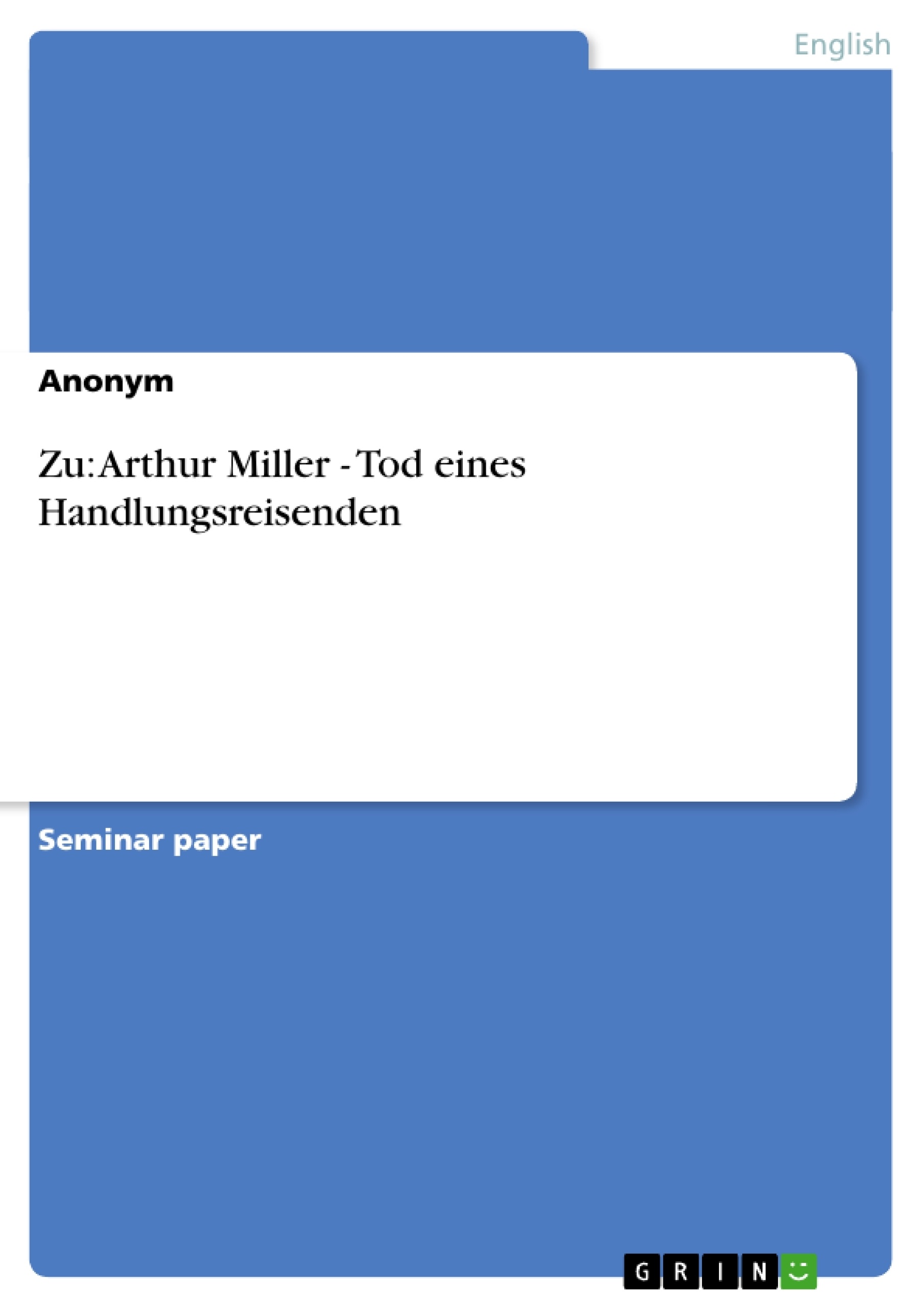When Willy Loman is heard racing off with his car at the end of Arthur Millers play Death of a Salesman, nobody doubts why he is doing so. He wrecks his car and kills himself to leave his family 20,000 dollars insurance money. Willy Loman is a suicide. And yet every viewer of the play will ask himself 1 who or what killed this man. What are the forces that pushed him towards this somber end? The fact that Arthur Miller pursues genuine moral education in his plays, which he has repeatedly admitted to (for example in “The Salesman Has a Birthday”) justifies this question. For how one answers it decides what kind of message one distils from the play. In this paper, I will not focus on a possible moral message of the play. Instead, I will try to collect hints at who or what might be responsible for Willy Loman’s death. As I am not the first to engage in this matter, I will be able to present the viewpoints of different critics, and to compare them. It seems to be a characteristic of Death of a Salesman that many reasons can be named for its catastrophic ending - its discussion has been very controversial. In consequence, one difficulty of my investigation will be to take into account also the play’s subtleties in order to value each critic’s standpoint properly. It has repeatedly been criticized that Arthur Miller makes use of fuzzy logic in his play. On the one hand, one can see obvious traits of social criticism in Death of a Salesman, on the other hand Miller presents two characters - Charley and Bernard - that succeed in a capitalistic world without acting unfair. Miller condemns a social order ruled by wealth while approving of the right way to live in it. This conflict demonstrates that Miller’s play is offering explanations of Willy Loman’s failure that are based on social criticism as well as explanations that are psychologically motivated. This division marks the two directions criticism has been following through the years. For that reason, I will divide my inquiry into two sections: Cultural Reasons and Psychological Reasons. Whenever necessary, the two domains will be cross-linked in order to form a synthesis.
Inhaltsverzeichnis (Table of Contents)
- Introduction
- Cultural Reasons
- The Economic System
- The Popular Myths of Success
- Psychological Reasons
- Undeserved Love
- The Irrational Desire for Success
- The Will to Save His Dignity
- Biff
- Linda
- Conclusion
Zielsetzung und Themenschwerpunkte (Objectives and Key Themes)
This paper aims to explore the potential reasons behind Willy Loman's tragic suicide in Arthur Miller's play "Death of a Salesman," examining various critical perspectives. It avoids focusing on the play's moral message and instead investigates the cultural and psychological factors that might have contributed to his demise.
- The influence of the economic system and its impact on Willy's life
- The role of popular myths of success and their effect on Willy's aspirations
- The psychological motivations behind Willy's actions, including his desire for love, success, and dignity
- The complex relationship between Willy and his son, Biff
- The influence of Willy's brother, Ben, as a symbol of wealth and success
Zusammenfassung der Kapitel (Chapter Summaries)
- Introduction: Introduces the play "Death of a Salesman" and Willy Loman's suicide. It highlights the controversy surrounding the reasons for his death and the importance of exploring different critical perspectives.
- Cultural Reasons: This chapter focuses on the social and economic factors that might have contributed to Willy's downfall. It analyzes the portrayal of the capitalist system in the play and its impact on individuals like Willy. The chapter also explores the role of popular myths of success in shaping Willy's worldview and actions.
- The Economic System: This section dives deeper into the economic aspects of the play, examining how Willy struggles with the new technologies and the cutthroat nature of the business world. It analyzes Willy's alienation from his work and his environment, highlighting his inability to adapt to the changing realities of the capitalist system.
- The Popular Myths of Success: This section explores how Willy is influenced by the popular myths of success, specifically represented by his brother Ben, a figure who embodies wealth and success achieved through ruthless means.
Schlüsselwörter (Keywords)
The primary focus of this analysis is on the interplay between cultural and psychological factors in shaping the tragic fate of Willy Loman. Key concepts include the economic system, popular myths of success, the psychology of desire, alienation, and the influence of family relationships. Through a critical examination of these themes, the essay aims to shed light on the complex forces at play in Willy's demise.
- Arbeit zitieren
- Anonym (Autor:in), 2005, Zu: Arthur Miller - Tod eines Handlungsreisenden, München, GRIN Verlag, https://www.grin.com/document/71906



